Repatriation Challenges
VerifiedAdded on 2023/03/17
|10
|3052
|36
AI Summary
This article discusses the challenges faced by repatriates when returning to their home country. It explores the impact on identity, relationships, and career development. The article also highlights the lack of support and solutions provided by companies and organizations. Find valuable insights and solutions for a smooth transition.
Contribute Materials
Your contribution can guide someone’s learning journey. Share your
documents today.
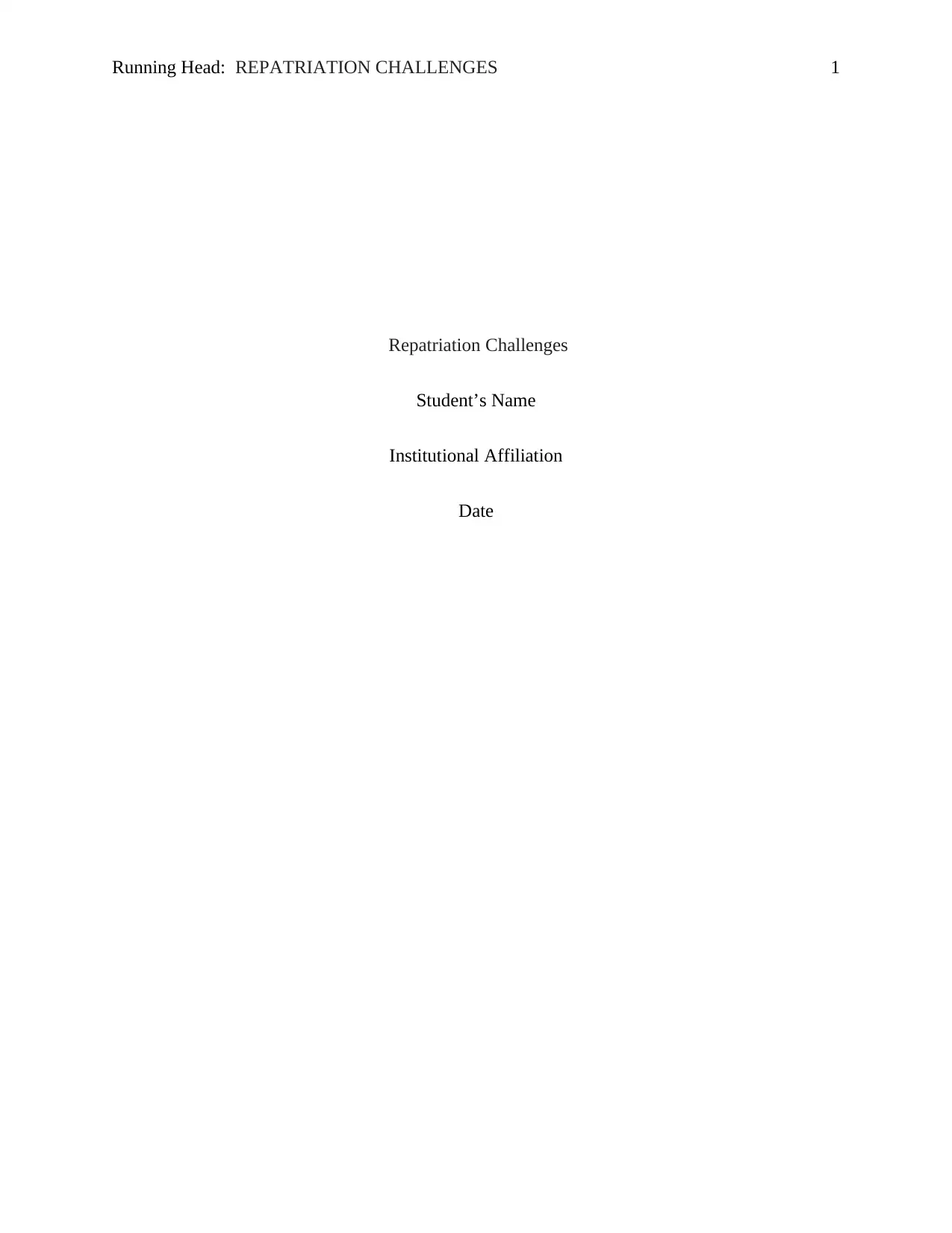
Running Head: REPATRIATION CHALLENGES 1
Repatriation Challenges
Student’s Name
Institutional Affiliation
Date
Repatriation Challenges
Student’s Name
Institutional Affiliation
Date
Secure Best Marks with AI Grader
Need help grading? Try our AI Grader for instant feedback on your assignments.
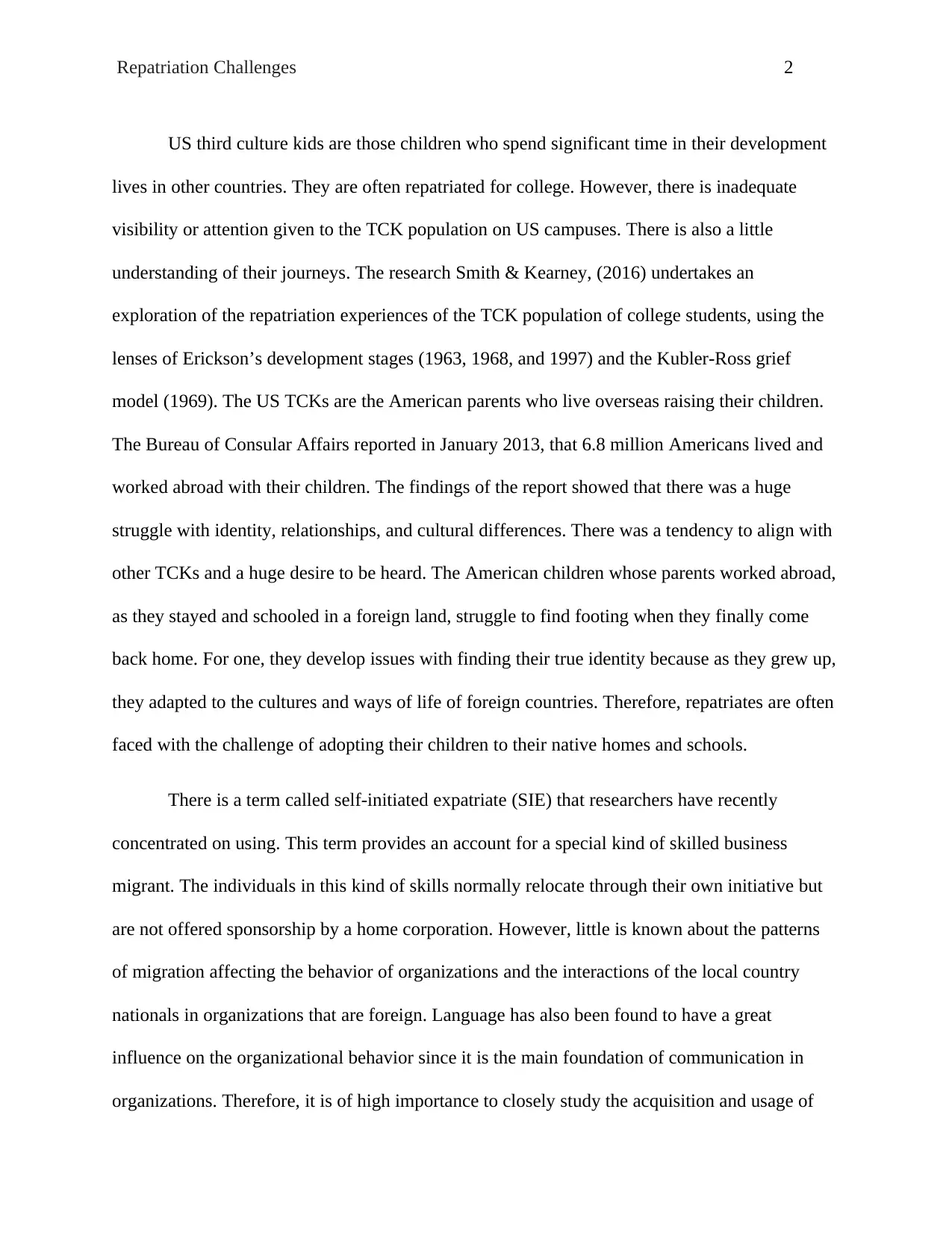
Repatriation Challenges 2
US third culture kids are those children who spend significant time in their development
lives in other countries. They are often repatriated for college. However, there is inadequate
visibility or attention given to the TCK population on US campuses. There is also a little
understanding of their journeys. The research Smith & Kearney, (2016) undertakes an
exploration of the repatriation experiences of the TCK population of college students, using the
lenses of Erickson’s development stages (1963, 1968, and 1997) and the Kubler-Ross grief
model (1969). The US TCKs are the American parents who live overseas raising their children.
The Bureau of Consular Affairs reported in January 2013, that 6.8 million Americans lived and
worked abroad with their children. The findings of the report showed that there was a huge
struggle with identity, relationships, and cultural differences. There was a tendency to align with
other TCKs and a huge desire to be heard. The American children whose parents worked abroad,
as they stayed and schooled in a foreign land, struggle to find footing when they finally come
back home. For one, they develop issues with finding their true identity because as they grew up,
they adapted to the cultures and ways of life of foreign countries. Therefore, repatriates are often
faced with the challenge of adopting their children to their native homes and schools.
There is a term called self-initiated expatriate (SIE) that researchers have recently
concentrated on using. This term provides an account for a special kind of skilled business
migrant. The individuals in this kind of skills normally relocate through their own initiative but
are not offered sponsorship by a home corporation. However, little is known about the patterns
of migration affecting the behavior of organizations and the interactions of the local country
nationals in organizations that are foreign. Language has also been found to have a great
influence on the organizational behavior since it is the main foundation of communication in
organizations. Therefore, it is of high importance to closely study the acquisition and usage of
US third culture kids are those children who spend significant time in their development
lives in other countries. They are often repatriated for college. However, there is inadequate
visibility or attention given to the TCK population on US campuses. There is also a little
understanding of their journeys. The research Smith & Kearney, (2016) undertakes an
exploration of the repatriation experiences of the TCK population of college students, using the
lenses of Erickson’s development stages (1963, 1968, and 1997) and the Kubler-Ross grief
model (1969). The US TCKs are the American parents who live overseas raising their children.
The Bureau of Consular Affairs reported in January 2013, that 6.8 million Americans lived and
worked abroad with their children. The findings of the report showed that there was a huge
struggle with identity, relationships, and cultural differences. There was a tendency to align with
other TCKs and a huge desire to be heard. The American children whose parents worked abroad,
as they stayed and schooled in a foreign land, struggle to find footing when they finally come
back home. For one, they develop issues with finding their true identity because as they grew up,
they adapted to the cultures and ways of life of foreign countries. Therefore, repatriates are often
faced with the challenge of adopting their children to their native homes and schools.
There is a term called self-initiated expatriate (SIE) that researchers have recently
concentrated on using. This term provides an account for a special kind of skilled business
migrant. The individuals in this kind of skills normally relocate through their own initiative but
are not offered sponsorship by a home corporation. However, little is known about the patterns
of migration affecting the behavior of organizations and the interactions of the local country
nationals in organizations that are foreign. Language has also been found to have a great
influence on the organizational behavior since it is the main foundation of communication in
organizations. Therefore, it is of high importance to closely study the acquisition and usage of
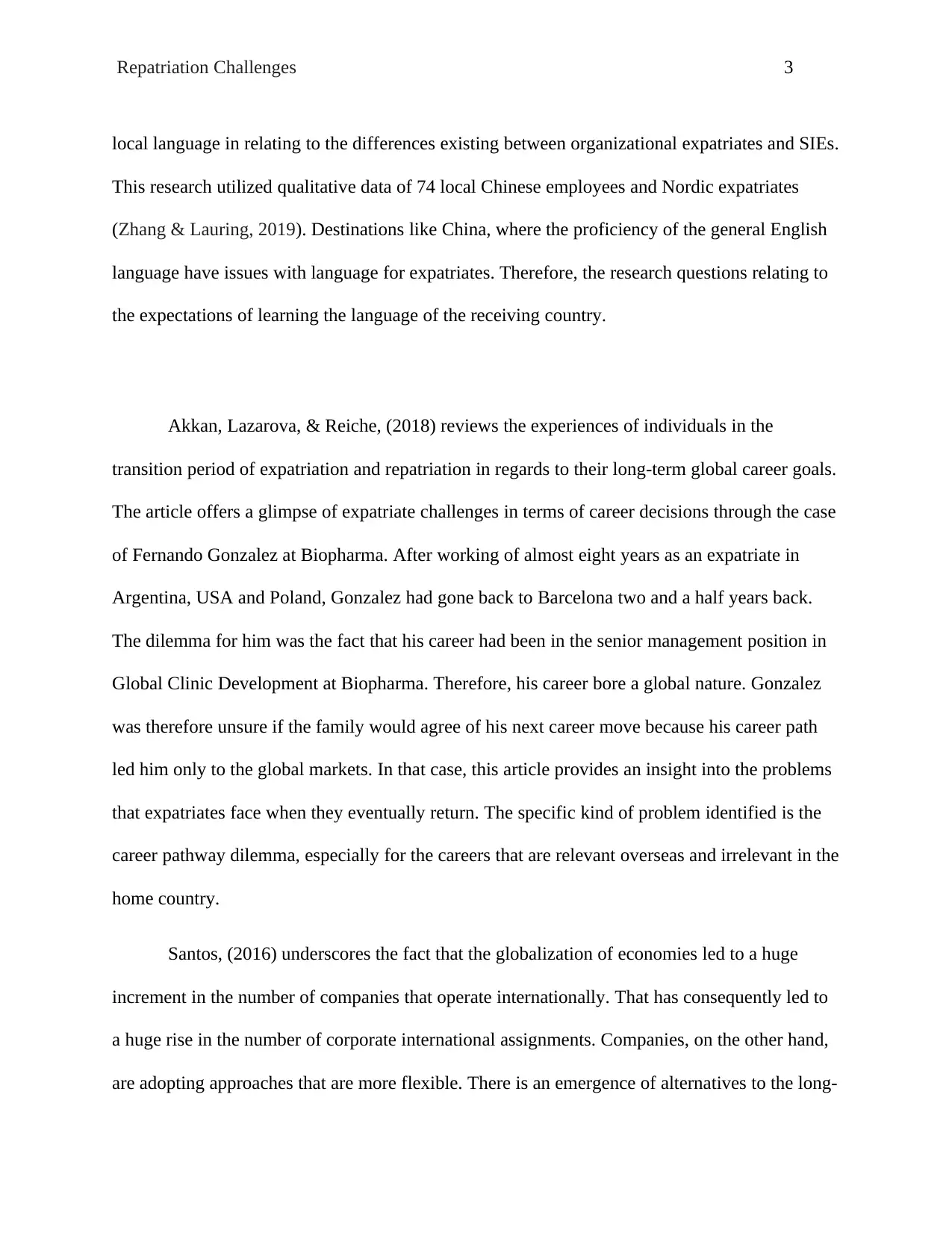
Repatriation Challenges 3
local language in relating to the differences existing between organizational expatriates and SIEs.
This research utilized qualitative data of 74 local Chinese employees and Nordic expatriates
(Zhang & Lauring, 2019). Destinations like China, where the proficiency of the general English
language have issues with language for expatriates. Therefore, the research questions relating to
the expectations of learning the language of the receiving country.
Akkan, Lazarova, & Reiche, (2018) reviews the experiences of individuals in the
transition period of expatriation and repatriation in regards to their long-term global career goals.
The article offers a glimpse of expatriate challenges in terms of career decisions through the case
of Fernando Gonzalez at Biopharma. After working of almost eight years as an expatriate in
Argentina, USA and Poland, Gonzalez had gone back to Barcelona two and a half years back.
The dilemma for him was the fact that his career had been in the senior management position in
Global Clinic Development at Biopharma. Therefore, his career bore a global nature. Gonzalez
was therefore unsure if the family would agree of his next career move because his career path
led him only to the global markets. In that case, this article provides an insight into the problems
that expatriates face when they eventually return. The specific kind of problem identified is the
career pathway dilemma, especially for the careers that are relevant overseas and irrelevant in the
home country.
Santos, (2016) underscores the fact that the globalization of economies led to a huge
increment in the number of companies that operate internationally. That has consequently led to
a huge rise in the number of corporate international assignments. Companies, on the other hand,
are adopting approaches that are more flexible. There is an emergence of alternatives to the long-
local language in relating to the differences existing between organizational expatriates and SIEs.
This research utilized qualitative data of 74 local Chinese employees and Nordic expatriates
(Zhang & Lauring, 2019). Destinations like China, where the proficiency of the general English
language have issues with language for expatriates. Therefore, the research questions relating to
the expectations of learning the language of the receiving country.
Akkan, Lazarova, & Reiche, (2018) reviews the experiences of individuals in the
transition period of expatriation and repatriation in regards to their long-term global career goals.
The article offers a glimpse of expatriate challenges in terms of career decisions through the case
of Fernando Gonzalez at Biopharma. After working of almost eight years as an expatriate in
Argentina, USA and Poland, Gonzalez had gone back to Barcelona two and a half years back.
The dilemma for him was the fact that his career had been in the senior management position in
Global Clinic Development at Biopharma. Therefore, his career bore a global nature. Gonzalez
was therefore unsure if the family would agree of his next career move because his career path
led him only to the global markets. In that case, this article provides an insight into the problems
that expatriates face when they eventually return. The specific kind of problem identified is the
career pathway dilemma, especially for the careers that are relevant overseas and irrelevant in the
home country.
Santos, (2016) underscores the fact that the globalization of economies led to a huge
increment in the number of companies that operate internationally. That has consequently led to
a huge rise in the number of corporate international assignments. Companies, on the other hand,
are adopting approaches that are more flexible. There is an emergence of alternatives to the long-
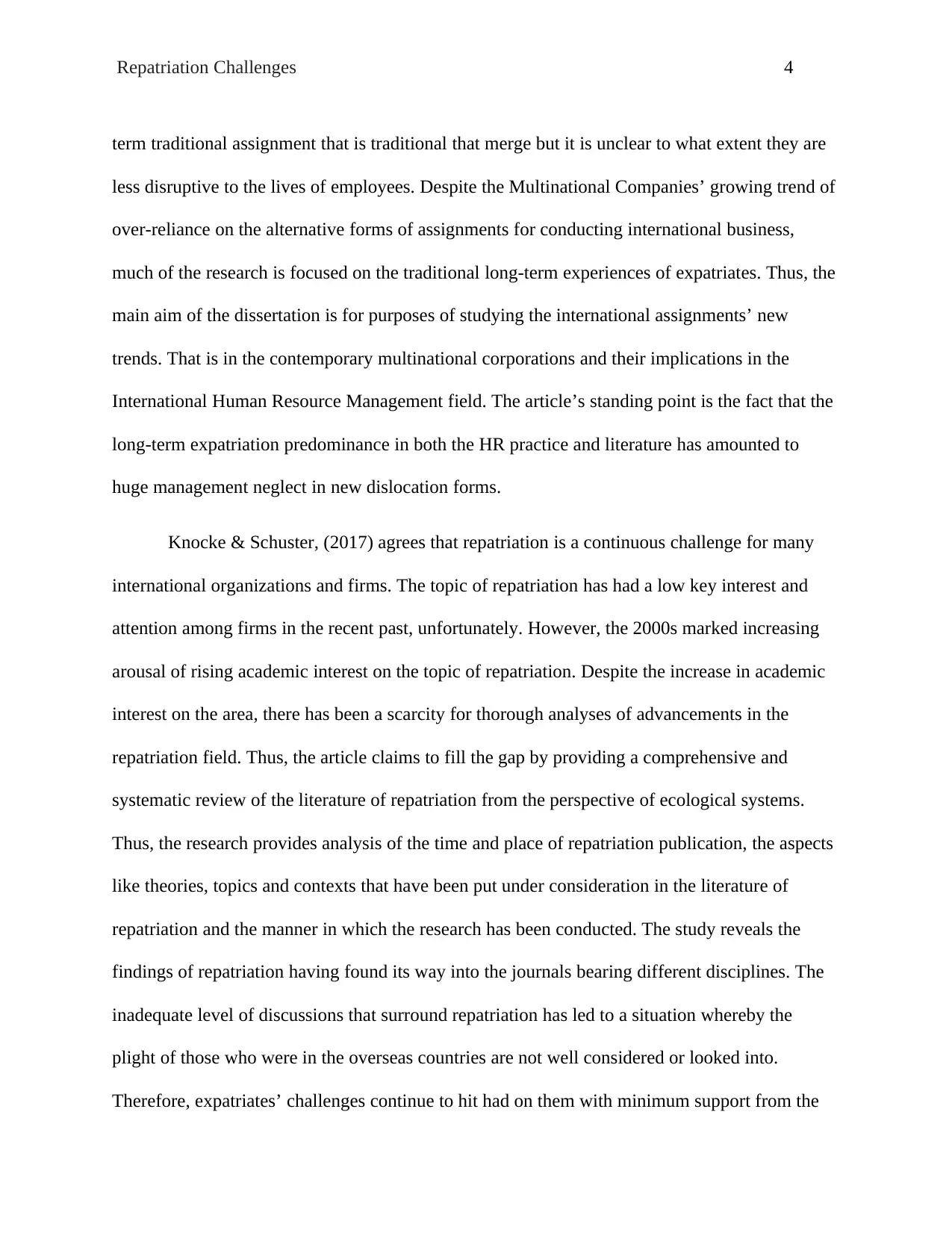
Repatriation Challenges 4
term traditional assignment that is traditional that merge but it is unclear to what extent they are
less disruptive to the lives of employees. Despite the Multinational Companies’ growing trend of
over-reliance on the alternative forms of assignments for conducting international business,
much of the research is focused on the traditional long-term experiences of expatriates. Thus, the
main aim of the dissertation is for purposes of studying the international assignments’ new
trends. That is in the contemporary multinational corporations and their implications in the
International Human Resource Management field. The article’s standing point is the fact that the
long-term expatriation predominance in both the HR practice and literature has amounted to
huge management neglect in new dislocation forms.
Knocke & Schuster, (2017) agrees that repatriation is a continuous challenge for many
international organizations and firms. The topic of repatriation has had a low key interest and
attention among firms in the recent past, unfortunately. However, the 2000s marked increasing
arousal of rising academic interest on the topic of repatriation. Despite the increase in academic
interest on the area, there has been a scarcity for thorough analyses of advancements in the
repatriation field. Thus, the article claims to fill the gap by providing a comprehensive and
systematic review of the literature of repatriation from the perspective of ecological systems.
Thus, the research provides analysis of the time and place of repatriation publication, the aspects
like theories, topics and contexts that have been put under consideration in the literature of
repatriation and the manner in which the research has been conducted. The study reveals the
findings of repatriation having found its way into the journals bearing different disciplines. The
inadequate level of discussions that surround repatriation has led to a situation whereby the
plight of those who were in the overseas countries are not well considered or looked into.
Therefore, expatriates’ challenges continue to hit had on them with minimum support from the
term traditional assignment that is traditional that merge but it is unclear to what extent they are
less disruptive to the lives of employees. Despite the Multinational Companies’ growing trend of
over-reliance on the alternative forms of assignments for conducting international business,
much of the research is focused on the traditional long-term experiences of expatriates. Thus, the
main aim of the dissertation is for purposes of studying the international assignments’ new
trends. That is in the contemporary multinational corporations and their implications in the
International Human Resource Management field. The article’s standing point is the fact that the
long-term expatriation predominance in both the HR practice and literature has amounted to
huge management neglect in new dislocation forms.
Knocke & Schuster, (2017) agrees that repatriation is a continuous challenge for many
international organizations and firms. The topic of repatriation has had a low key interest and
attention among firms in the recent past, unfortunately. However, the 2000s marked increasing
arousal of rising academic interest on the topic of repatriation. Despite the increase in academic
interest on the area, there has been a scarcity for thorough analyses of advancements in the
repatriation field. Thus, the article claims to fill the gap by providing a comprehensive and
systematic review of the literature of repatriation from the perspective of ecological systems.
Thus, the research provides analysis of the time and place of repatriation publication, the aspects
like theories, topics and contexts that have been put under consideration in the literature of
repatriation and the manner in which the research has been conducted. The study reveals the
findings of repatriation having found its way into the journals bearing different disciplines. The
inadequate level of discussions that surround repatriation has led to a situation whereby the
plight of those who were in the overseas countries are not well considered or looked into.
Therefore, expatriates’ challenges continue to hit had on them with minimum support from the
Secure Best Marks with AI Grader
Need help grading? Try our AI Grader for instant feedback on your assignments.
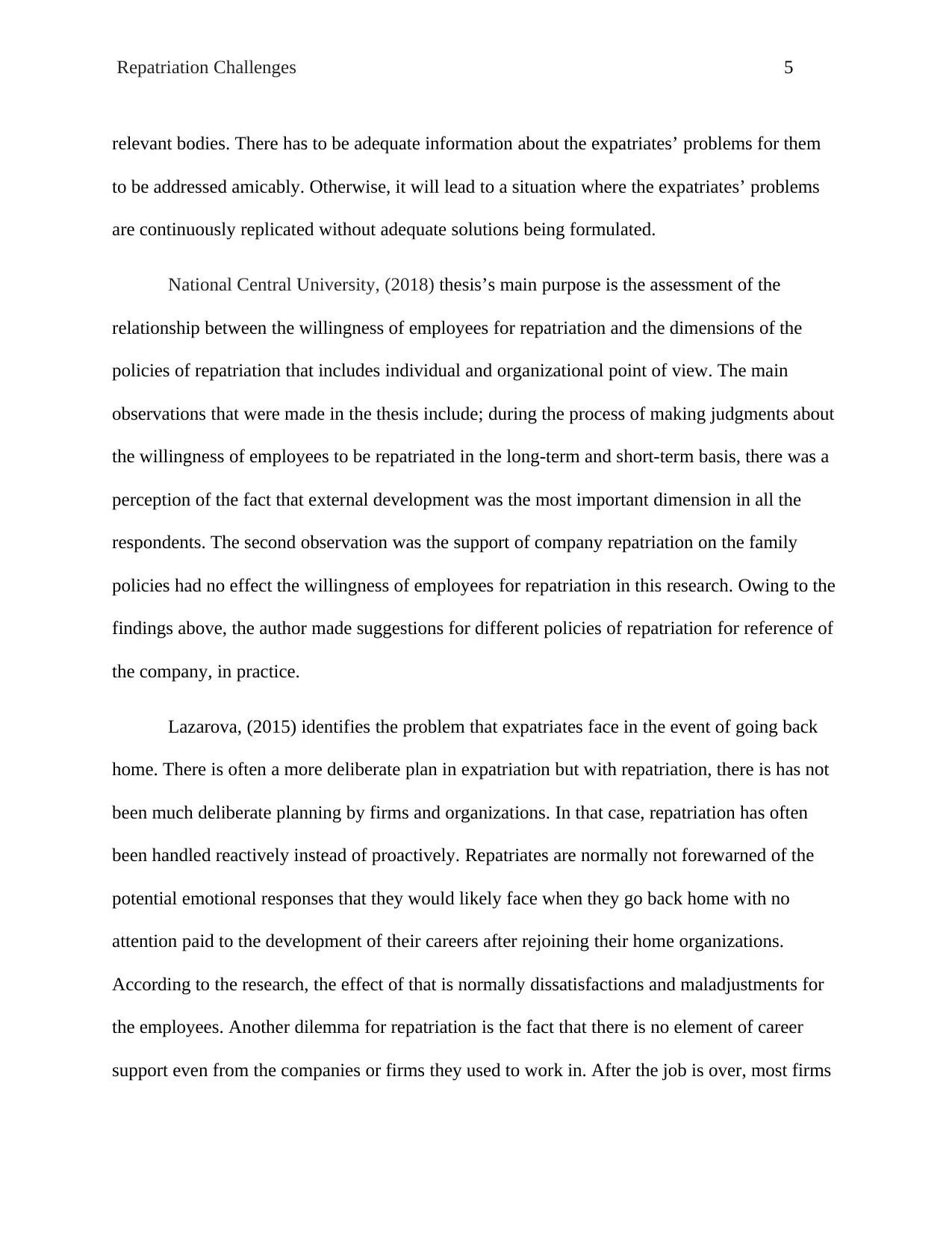
Repatriation Challenges 5
relevant bodies. There has to be adequate information about the expatriates’ problems for them
to be addressed amicably. Otherwise, it will lead to a situation where the expatriates’ problems
are continuously replicated without adequate solutions being formulated.
National Central University, (2018) thesis’s main purpose is the assessment of the
relationship between the willingness of employees for repatriation and the dimensions of the
policies of repatriation that includes individual and organizational point of view. The main
observations that were made in the thesis include; during the process of making judgments about
the willingness of employees to be repatriated in the long-term and short-term basis, there was a
perception of the fact that external development was the most important dimension in all the
respondents. The second observation was the support of company repatriation on the family
policies had no effect the willingness of employees for repatriation in this research. Owing to the
findings above, the author made suggestions for different policies of repatriation for reference of
the company, in practice.
Lazarova, (2015) identifies the problem that expatriates face in the event of going back
home. There is often a more deliberate plan in expatriation but with repatriation, there is has not
been much deliberate planning by firms and organizations. In that case, repatriation has often
been handled reactively instead of proactively. Repatriates are normally not forewarned of the
potential emotional responses that they would likely face when they go back home with no
attention paid to the development of their careers after rejoining their home organizations.
According to the research, the effect of that is normally dissatisfactions and maladjustments for
the employees. Another dilemma for repatriation is the fact that there is no element of career
support even from the companies or firms they used to work in. After the job is over, most firms
relevant bodies. There has to be adequate information about the expatriates’ problems for them
to be addressed amicably. Otherwise, it will lead to a situation where the expatriates’ problems
are continuously replicated without adequate solutions being formulated.
National Central University, (2018) thesis’s main purpose is the assessment of the
relationship between the willingness of employees for repatriation and the dimensions of the
policies of repatriation that includes individual and organizational point of view. The main
observations that were made in the thesis include; during the process of making judgments about
the willingness of employees to be repatriated in the long-term and short-term basis, there was a
perception of the fact that external development was the most important dimension in all the
respondents. The second observation was the support of company repatriation on the family
policies had no effect the willingness of employees for repatriation in this research. Owing to the
findings above, the author made suggestions for different policies of repatriation for reference of
the company, in practice.
Lazarova, (2015) identifies the problem that expatriates face in the event of going back
home. There is often a more deliberate plan in expatriation but with repatriation, there is has not
been much deliberate planning by firms and organizations. In that case, repatriation has often
been handled reactively instead of proactively. Repatriates are normally not forewarned of the
potential emotional responses that they would likely face when they go back home with no
attention paid to the development of their careers after rejoining their home organizations.
According to the research, the effect of that is normally dissatisfactions and maladjustments for
the employees. Another dilemma for repatriation is the fact that there is no element of career
support even from the companies or firms they used to work in. After the job is over, most firms
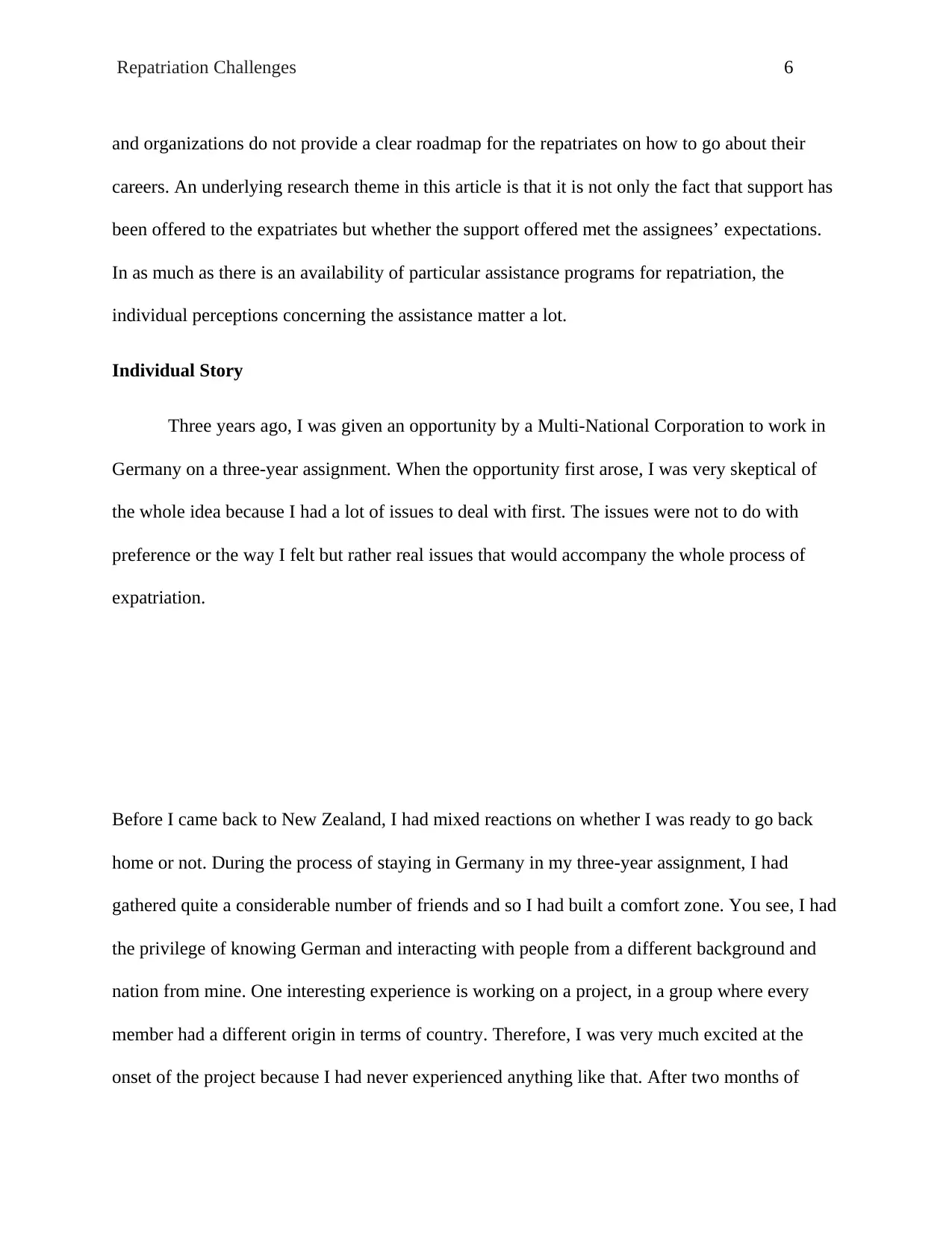
Repatriation Challenges 6
and organizations do not provide a clear roadmap for the repatriates on how to go about their
careers. An underlying research theme in this article is that it is not only the fact that support has
been offered to the expatriates but whether the support offered met the assignees’ expectations.
In as much as there is an availability of particular assistance programs for repatriation, the
individual perceptions concerning the assistance matter a lot.
Individual Story
Three years ago, I was given an opportunity by a Multi-National Corporation to work in
Germany on a three-year assignment. When the opportunity first arose, I was very skeptical of
the whole idea because I had a lot of issues to deal with first. The issues were not to do with
preference or the way I felt but rather real issues that would accompany the whole process of
expatriation.
Before I came back to New Zealand, I had mixed reactions on whether I was ready to go back
home or not. During the process of staying in Germany in my three-year assignment, I had
gathered quite a considerable number of friends and so I had built a comfort zone. You see, I had
the privilege of knowing German and interacting with people from a different background and
nation from mine. One interesting experience is working on a project, in a group where every
member had a different origin in terms of country. Therefore, I was very much excited at the
onset of the project because I had never experienced anything like that. After two months of
and organizations do not provide a clear roadmap for the repatriates on how to go about their
careers. An underlying research theme in this article is that it is not only the fact that support has
been offered to the expatriates but whether the support offered met the assignees’ expectations.
In as much as there is an availability of particular assistance programs for repatriation, the
individual perceptions concerning the assistance matter a lot.
Individual Story
Three years ago, I was given an opportunity by a Multi-National Corporation to work in
Germany on a three-year assignment. When the opportunity first arose, I was very skeptical of
the whole idea because I had a lot of issues to deal with first. The issues were not to do with
preference or the way I felt but rather real issues that would accompany the whole process of
expatriation.
Before I came back to New Zealand, I had mixed reactions on whether I was ready to go back
home or not. During the process of staying in Germany in my three-year assignment, I had
gathered quite a considerable number of friends and so I had built a comfort zone. You see, I had
the privilege of knowing German and interacting with people from a different background and
nation from mine. One interesting experience is working on a project, in a group where every
member had a different origin in terms of country. Therefore, I was very much excited at the
onset of the project because I had never experienced anything like that. After two months of
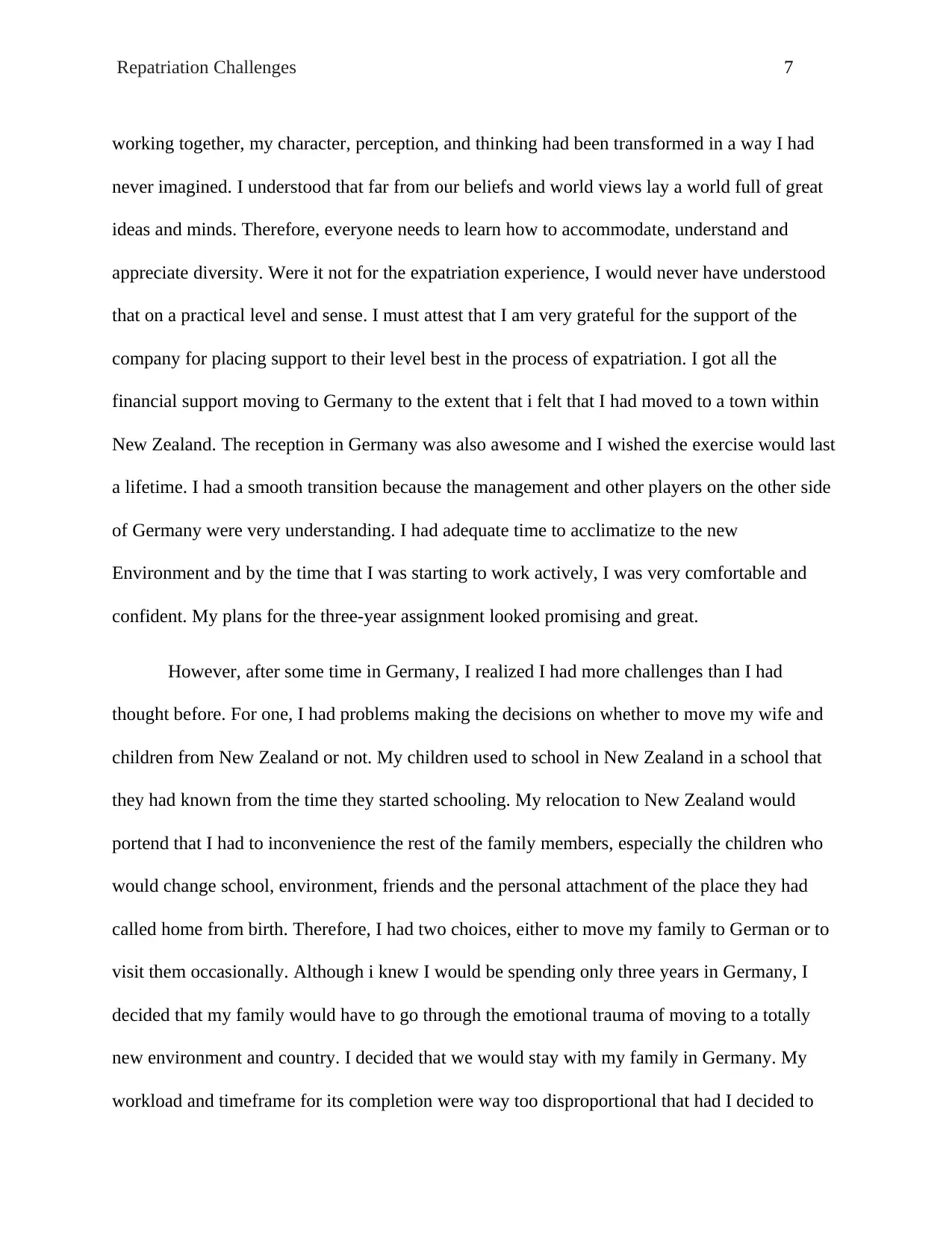
Repatriation Challenges 7
working together, my character, perception, and thinking had been transformed in a way I had
never imagined. I understood that far from our beliefs and world views lay a world full of great
ideas and minds. Therefore, everyone needs to learn how to accommodate, understand and
appreciate diversity. Were it not for the expatriation experience, I would never have understood
that on a practical level and sense. I must attest that I am very grateful for the support of the
company for placing support to their level best in the process of expatriation. I got all the
financial support moving to Germany to the extent that i felt that I had moved to a town within
New Zealand. The reception in Germany was also awesome and I wished the exercise would last
a lifetime. I had a smooth transition because the management and other players on the other side
of Germany were very understanding. I had adequate time to acclimatize to the new
Environment and by the time that I was starting to work actively, I was very comfortable and
confident. My plans for the three-year assignment looked promising and great.
However, after some time in Germany, I realized I had more challenges than I had
thought before. For one, I had problems making the decisions on whether to move my wife and
children from New Zealand or not. My children used to school in New Zealand in a school that
they had known from the time they started schooling. My relocation to New Zealand would
portend that I had to inconvenience the rest of the family members, especially the children who
would change school, environment, friends and the personal attachment of the place they had
called home from birth. Therefore, I had two choices, either to move my family to German or to
visit them occasionally. Although i knew I would be spending only three years in Germany, I
decided that my family would have to go through the emotional trauma of moving to a totally
new environment and country. I decided that we would stay with my family in Germany. My
workload and timeframe for its completion were way too disproportional that had I decided to
working together, my character, perception, and thinking had been transformed in a way I had
never imagined. I understood that far from our beliefs and world views lay a world full of great
ideas and minds. Therefore, everyone needs to learn how to accommodate, understand and
appreciate diversity. Were it not for the expatriation experience, I would never have understood
that on a practical level and sense. I must attest that I am very grateful for the support of the
company for placing support to their level best in the process of expatriation. I got all the
financial support moving to Germany to the extent that i felt that I had moved to a town within
New Zealand. The reception in Germany was also awesome and I wished the exercise would last
a lifetime. I had a smooth transition because the management and other players on the other side
of Germany were very understanding. I had adequate time to acclimatize to the new
Environment and by the time that I was starting to work actively, I was very comfortable and
confident. My plans for the three-year assignment looked promising and great.
However, after some time in Germany, I realized I had more challenges than I had
thought before. For one, I had problems making the decisions on whether to move my wife and
children from New Zealand or not. My children used to school in New Zealand in a school that
they had known from the time they started schooling. My relocation to New Zealand would
portend that I had to inconvenience the rest of the family members, especially the children who
would change school, environment, friends and the personal attachment of the place they had
called home from birth. Therefore, I had two choices, either to move my family to German or to
visit them occasionally. Although i knew I would be spending only three years in Germany, I
decided that my family would have to go through the emotional trauma of moving to a totally
new environment and country. I decided that we would stay with my family in Germany. My
workload and timeframe for its completion were way too disproportional that had I decided to
Paraphrase This Document
Need a fresh take? Get an instant paraphrase of this document with our AI Paraphraser
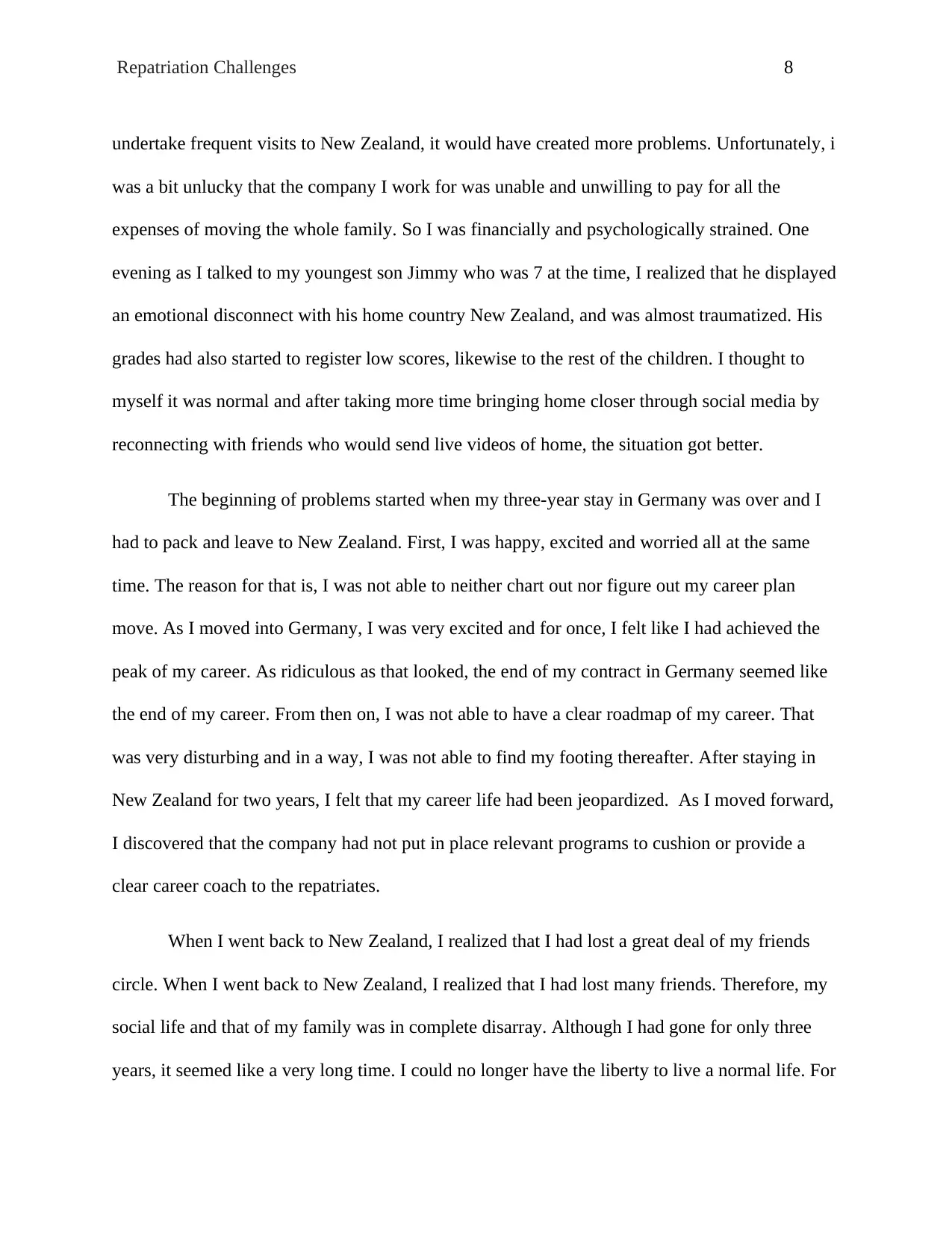
Repatriation Challenges 8
undertake frequent visits to New Zealand, it would have created more problems. Unfortunately, i
was a bit unlucky that the company I work for was unable and unwilling to pay for all the
expenses of moving the whole family. So I was financially and psychologically strained. One
evening as I talked to my youngest son Jimmy who was 7 at the time, I realized that he displayed
an emotional disconnect with his home country New Zealand, and was almost traumatized. His
grades had also started to register low scores, likewise to the rest of the children. I thought to
myself it was normal and after taking more time bringing home closer through social media by
reconnecting with friends who would send live videos of home, the situation got better.
The beginning of problems started when my three-year stay in Germany was over and I
had to pack and leave to New Zealand. First, I was happy, excited and worried all at the same
time. The reason for that is, I was not able to neither chart out nor figure out my career plan
move. As I moved into Germany, I was very excited and for once, I felt like I had achieved the
peak of my career. As ridiculous as that looked, the end of my contract in Germany seemed like
the end of my career. From then on, I was not able to have a clear roadmap of my career. That
was very disturbing and in a way, I was not able to find my footing thereafter. After staying in
New Zealand for two years, I felt that my career life had been jeopardized. As I moved forward,
I discovered that the company had not put in place relevant programs to cushion or provide a
clear career coach to the repatriates.
When I went back to New Zealand, I realized that I had lost a great deal of my friends
circle. When I went back to New Zealand, I realized that I had lost many friends. Therefore, my
social life and that of my family was in complete disarray. Although I had gone for only three
years, it seemed like a very long time. I could no longer have the liberty to live a normal life. For
undertake frequent visits to New Zealand, it would have created more problems. Unfortunately, i
was a bit unlucky that the company I work for was unable and unwilling to pay for all the
expenses of moving the whole family. So I was financially and psychologically strained. One
evening as I talked to my youngest son Jimmy who was 7 at the time, I realized that he displayed
an emotional disconnect with his home country New Zealand, and was almost traumatized. His
grades had also started to register low scores, likewise to the rest of the children. I thought to
myself it was normal and after taking more time bringing home closer through social media by
reconnecting with friends who would send live videos of home, the situation got better.
The beginning of problems started when my three-year stay in Germany was over and I
had to pack and leave to New Zealand. First, I was happy, excited and worried all at the same
time. The reason for that is, I was not able to neither chart out nor figure out my career plan
move. As I moved into Germany, I was very excited and for once, I felt like I had achieved the
peak of my career. As ridiculous as that looked, the end of my contract in Germany seemed like
the end of my career. From then on, I was not able to have a clear roadmap of my career. That
was very disturbing and in a way, I was not able to find my footing thereafter. After staying in
New Zealand for two years, I felt that my career life had been jeopardized. As I moved forward,
I discovered that the company had not put in place relevant programs to cushion or provide a
clear career coach to the repatriates.
When I went back to New Zealand, I realized that I had lost a great deal of my friends
circle. When I went back to New Zealand, I realized that I had lost many friends. Therefore, my
social life and that of my family was in complete disarray. Although I had gone for only three
years, it seemed like a very long time. I could no longer have the liberty to live a normal life. For
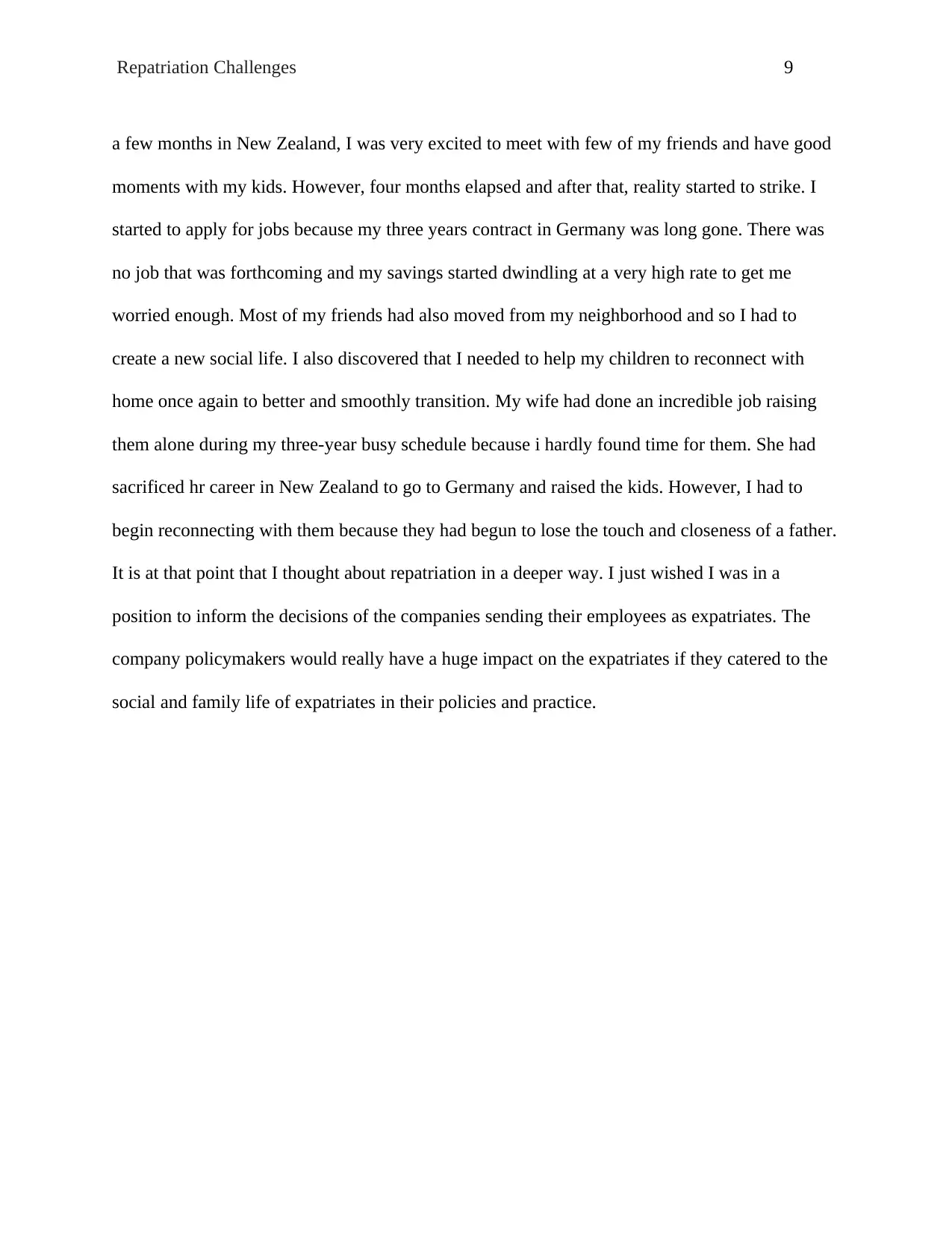
Repatriation Challenges 9
a few months in New Zealand, I was very excited to meet with few of my friends and have good
moments with my kids. However, four months elapsed and after that, reality started to strike. I
started to apply for jobs because my three years contract in Germany was long gone. There was
no job that was forthcoming and my savings started dwindling at a very high rate to get me
worried enough. Most of my friends had also moved from my neighborhood and so I had to
create a new social life. I also discovered that I needed to help my children to reconnect with
home once again to better and smoothly transition. My wife had done an incredible job raising
them alone during my three-year busy schedule because i hardly found time for them. She had
sacrificed hr career in New Zealand to go to Germany and raised the kids. However, I had to
begin reconnecting with them because they had begun to lose the touch and closeness of a father.
It is at that point that I thought about repatriation in a deeper way. I just wished I was in a
position to inform the decisions of the companies sending their employees as expatriates. The
company policymakers would really have a huge impact on the expatriates if they catered to the
social and family life of expatriates in their policies and practice.
a few months in New Zealand, I was very excited to meet with few of my friends and have good
moments with my kids. However, four months elapsed and after that, reality started to strike. I
started to apply for jobs because my three years contract in Germany was long gone. There was
no job that was forthcoming and my savings started dwindling at a very high rate to get me
worried enough. Most of my friends had also moved from my neighborhood and so I had to
create a new social life. I also discovered that I needed to help my children to reconnect with
home once again to better and smoothly transition. My wife had done an incredible job raising
them alone during my three-year busy schedule because i hardly found time for them. She had
sacrificed hr career in New Zealand to go to Germany and raised the kids. However, I had to
begin reconnecting with them because they had begun to lose the touch and closeness of a father.
It is at that point that I thought about repatriation in a deeper way. I just wished I was in a
position to inform the decisions of the companies sending their employees as expatriates. The
company policymakers would really have a huge impact on the expatriates if they catered to the
social and family life of expatriates in their policies and practice.
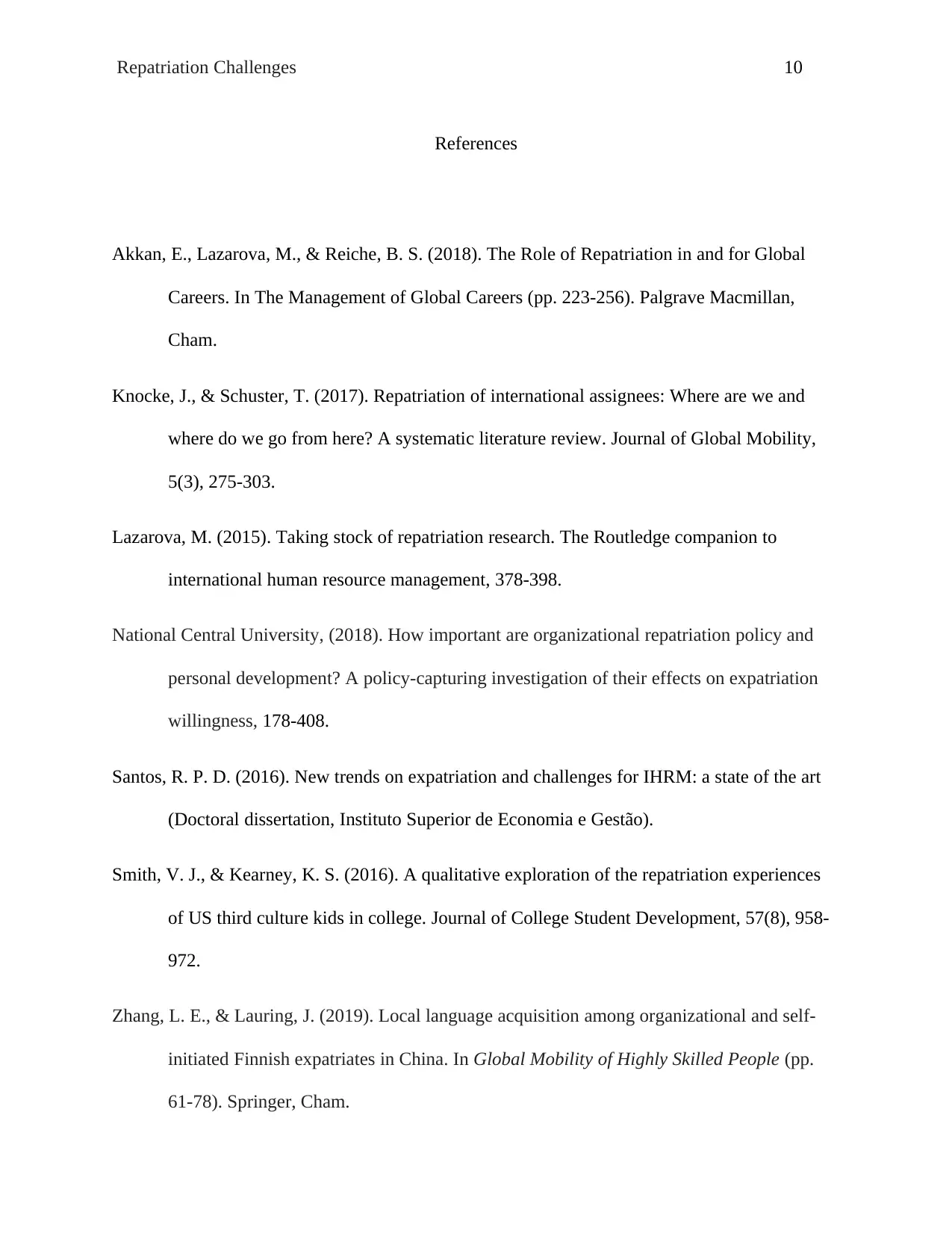
Repatriation Challenges 10
References
Akkan, E., Lazarova, M., & Reiche, B. S. (2018). The Role of Repatriation in and for Global
Careers. In The Management of Global Careers (pp. 223-256). Palgrave Macmillan,
Cham.
Knocke, J., & Schuster, T. (2017). Repatriation of international assignees: Where are we and
where do we go from here? A systematic literature review. Journal of Global Mobility,
5(3), 275-303.
Lazarova, M. (2015). Taking stock of repatriation research. The Routledge companion to
international human resource management, 378-398.
National Central University, (2018). How important are organizational repatriation policy and
personal development? A policy-capturing investigation of their effects on expatriation
willingness, 178-408.
Santos, R. P. D. (2016). New trends on expatriation and challenges for IHRM: a state of the art
(Doctoral dissertation, Instituto Superior de Economia e Gestão).
Smith, V. J., & Kearney, K. S. (2016). A qualitative exploration of the repatriation experiences
of US third culture kids in college. Journal of College Student Development, 57(8), 958-
972.
Zhang, L. E., & Lauring, J. (2019). Local language acquisition among organizational and self-
initiated Finnish expatriates in China. In Global Mobility of Highly Skilled People (pp.
61-78). Springer, Cham.
References
Akkan, E., Lazarova, M., & Reiche, B. S. (2018). The Role of Repatriation in and for Global
Careers. In The Management of Global Careers (pp. 223-256). Palgrave Macmillan,
Cham.
Knocke, J., & Schuster, T. (2017). Repatriation of international assignees: Where are we and
where do we go from here? A systematic literature review. Journal of Global Mobility,
5(3), 275-303.
Lazarova, M. (2015). Taking stock of repatriation research. The Routledge companion to
international human resource management, 378-398.
National Central University, (2018). How important are organizational repatriation policy and
personal development? A policy-capturing investigation of their effects on expatriation
willingness, 178-408.
Santos, R. P. D. (2016). New trends on expatriation and challenges for IHRM: a state of the art
(Doctoral dissertation, Instituto Superior de Economia e Gestão).
Smith, V. J., & Kearney, K. S. (2016). A qualitative exploration of the repatriation experiences
of US third culture kids in college. Journal of College Student Development, 57(8), 958-
972.
Zhang, L. E., & Lauring, J. (2019). Local language acquisition among organizational and self-
initiated Finnish expatriates in China. In Global Mobility of Highly Skilled People (pp.
61-78). Springer, Cham.
1 out of 10
Related Documents
Your All-in-One AI-Powered Toolkit for Academic Success.
+13062052269
info@desklib.com
Available 24*7 on WhatsApp / Email
![[object Object]](/_next/static/media/star-bottom.7253800d.svg)
Unlock your academic potential
© 2024 | Zucol Services PVT LTD | All rights reserved.




